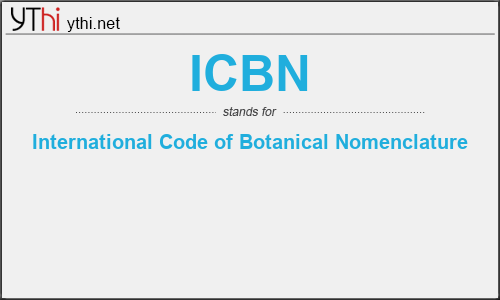What does ICBN mean? What is the full form of ICBN?
The Full Form of ICBN is International Code of Botanical Nomenclature.
The International Code of Nomenclature for algae, fungi, and plants (ICN) is the set of rules and recommendations dealing with the formal botanical names that are given to plants, fungi and a few other groups of organisms, all those “traditionally treated as algae, fungi, or plants”. It was formerly called the International Code of Botanical Nomenclature (ICBN); the name was changed at the International Botanical Congress in Melbourne in July 2011 as part of the Melbourne Code which replaced the Vienna Code of 2005
The International Code of Botanical Nomenclature (ICBN) is the set of rules and recommendations dealing with the formal botanical names that are given to plants. Its intent is that each taxonomic group (“taxon”, plural “taxa”) of plants has only one correct name that is accepted worldwide. The value of a scientific name is that it is an identifier; it is not necessarily of descriptive value, or even accurate.
The guiding principle in botanical nomenclature is priority. The ICBN sets the formal starting date of plant nomenclature at 1 May 1753, the publication of Species Plantarum by Linnaeus (or at later dates for specified groups and ranks).
A botanical name is fixed to a taxon by a type. This is almost invariably dried plant material and is usually deposited and preserved in a herbarium, though can be an image. Some type collections can be viewed online at the websites of the herbaria in question.
Both these principles are regulated and limited. To avoid undesirable effects of priority, conservation of a name is possible. Above the taxonomic rank of family very few hard rules apply (e.g. see descriptive botanical names).
The ICBN can only be changed by an International Botanical Congress (IBC), with the International Association for Plant Taxonomy providing the supporting infrastructure. The present edition is the Vienna Code (2006), based on the decisions of the XVII IBC at Vienna 2005. This was preceded by the St Louis Code (2000) and the Tokyo Code (1994), both available online. Each new edition supersedes the earlier editions and is retroactive back to 1753, except where expressly limited.
Botanical nomenclature is independent of zoological and bacteriological nomenclature, which are governed by their own Codes (see Nomenclature Codes).
The ICBN applies not only to plants, as they are now defined, but also to other organisms traditionally studied by botanists. This includes blue-green algae (Cyanobacteria); fungi, including chytrids, oomycetes, and slime moulds; photosynthetic protists and taxonomically related non-photosynthetic groups. There are special provisions in the ICBN for some of these groups, as there are for fossils.
ICBN
means
International Code of Botanical Nomenclature![]()
Translate International Code of Botanical Nomenclature to other language.


Leave a Reply
You must be logged in to post a comment.